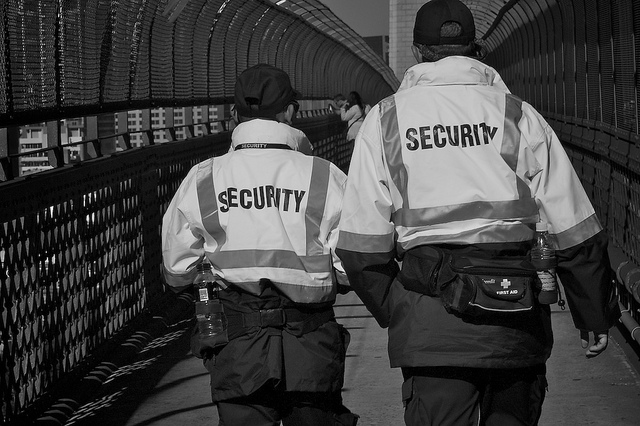Protecting communities: Australia’s licensed security personnel and counterterrorism
Posted By Anthony Bergin on October 17, 2018 @ 08:31

There are more than 120,000 licensed security guards in Australia. No one knows the exact number as each jurisdiction has a different way of defining security operators and determining who should be licensed and how. Some practitioners have licences in more than one state or territory, and of course not all security personnel are, or need to be, licensed.
The private security manpower sector plays a significant role in both preventing and responding to critical incidents, including terrorist attacks. Private security staff provide the ‘eyes, ears and hands’ before any attack and an ability to be first responders after any security-related incident.
By observing non-routine behaviour and unusual objects, they provide a deterrent through their presence, maintaining checkpoints, conducting bag screening and so on. They’re already on the spot and generally have an intimate knowledge of the normal comings and goings at each site. They’re uniformed and easily recognisable. They’re trained, albeit to varying levels, and can provide a cordon or direct people away from dangers. They understand command and control and communications.
The government, the private sector and the public rely on security guards to protect them and their assets. They’re used at large public gatherings such as major sporting events, community festivals, celebrations and special events, such as the Commonwealth Games. Private security also provides an important and significant presence at public transport hubs such as airports, railway stations and shipping ports as a line of defence and deterrence.
In a new ASPI report [1] published today, the actual and potential capabilities of the private security sector are examined in the context of Australian counterterrorism policy and planning. The report looks at the problems that are holding the sector back from being an active participant in national counterterrorist efforts.
In manpower numbers, the private guarding industry is much more significant than the police or military. The security industry has more than double the personnel of Australia’s combined police agencies and permanent Australian Defence Force.
National and jurisdictional forums for addressing terrorism include venue owners and operators, but the providers of guarding services aren’t always at the table.
While the guarding services workforce is expected and may even be contracted to carry out actions that relate to counterterrorism, the lack of appropriate and consistent training, the lack of consistent ‘fit and proper person’ requirements, the poor pay, the general low esteem and the inconsistencies between jurisdictions limit its potential in this role.
Clients (including government) of guarding providers tend to seek the lowest prices, often below award rates, without considering the quality of service provided. There are, however, pockets of excellence where private security is fully integrated, trusted and delivering effective security outcomes. But multijurisdictional inconsistencies and poorly delivered training remain key problems for the security guarding workforce.
The report makes seven recommendations:
- State and territory regulators should better monitor and enforce training standards within the licensed guarding sector.
- Training courses should include material on recognising suspicious behaviour associated with pre-incident terrorism activities and how and where to report suspicious activities.
- The security guarding sector should consider a career progression model for security officers.
- Consideration should be given to formalising additional powers for suitably trained security officers to enhance their ability to contribute to counterterrorism capabilities.
- The private security guarding sector should be engaged in relevant national and state forums that consider counterterrorism.
- Law enforcement agencies should be encouraged to liaise with the private security sector and have representatives from the sector address training courses to explain their functions and powers.
- A federal Security Industry Authority should be established as a statutory authority. The authority would control, record, monitor and enforce the licensing of identified elements of the private security sector.
The functions of the Security Industry Authority would include integrating the private security manpower sector into Australia’s counterterrorism strategy and defining and administering ‘fit and proper person’ requirements. It would also include training development and monitoring of delivery standards, as well as external confirmation of testing and competencies. It would develop counterterrorism awareness and training information.
Previous reports have recommended a standardisation of security licensing. The issue was put before the Council of Australian Governments in July 2008. COAG agreed to adopt a nationally consistent approach to the regulation of the private security industry, focusing initially on the guarding sector, to improve the probity, competence and skills of security personnel and the mobility of security industry licences across jurisdictions.
COAG asked the Ministerial Council for Police and Emergency Management to undertake further work on minimum regulatory standards for the technical sector of the industry by mid-2009, as well as proposals for a possible national system for security industry licensing by mid-2010. But almost nothing has happened to realise these COAG objectives of a decade ago.
Given the current rate of progress, it would be unfortunate if changes to our private security guard force industry were to occur only in the aftermath of a security crisis.
Article printed from The Strategist: https://www.aspistrategist.org.au
URL to article: https://www.aspistrategist.org.au/protecting-communities-australias-licensed-security-personnel-and-counterterrorism/
URLs in this post:
[1] new ASPI report: https://www.aspi.org.au/report/safety-numbers
Click here to print.